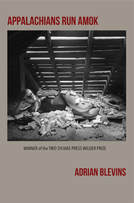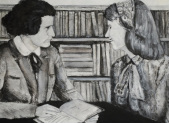Winner of the Two Sylvias Press Wilder Series Poetry Book Prize
The funniest, most woebegotten Appalachian blues ever written up North.
Praise for Appalachians Run Amok:
What did Dickinson say? That she knew it was poetry if she felt as if the top of her head was taken off? If that’s the standard, then hell yes this is poetry, and this is poetry that has lopped off my whole head and jammed me back into where and who I’m from. Blevins has found the sweet spot, building narratives that riff, stories that sing in the voice of the most combustible, lowdown country song sung by a “punk rock of a country heart.” Her subjects are Appalachian girlhood, love, death, and motherhood, in which infants smell “like not-death—like the earliest of the early yield—like kale and collards, maybe.” She story-sings of places where the water is “fat with the pee foam of cattle,” where people “live up a sidewinder the sidewinding likes of which only the dead can drive,” where the speaker remembers herself as “a teenage fugitive in a teenage redneck’s redneck truck,” Frank O’Hara and Ferlinghetti in her purse, “not needlepoint,” “never Einstein.” Death, for Blevins, is blah, and “when I say blah I mean blah,” but this poetry, cascading forward via a zillion ampersands run amok and a hilarious, provocative grief, is blah’s badass antidote.
—Diane Seuss
When you’re lucky enough to get your hands on a book of poems this alive, everything you say about it feels like an understatement. Yes, Appalachians Run Amok is utterly original, wild yet tight, feisty, vibrant, combustible. Yes, it’s bursting with keen-eyed tenderness and unshushable attitude. Yes, the poems’ startling emotional intelligence blends with myriad other intelligences (e.g. maternal, earthy, topical, humane, etc.) to create this voice, “all hot and giddy.” A proud daughter of Appalachia, Blevins gifts us with vivid glimpses of where she came of age. Reading her beautiful, linguistically limber, cascading descriptions is like shooting the rapids with an expert river rider at the helm.
—Amy Gerstler
Wildness of spirit seems to have evaporated from American poetry of late, thinned by the turpentine of earnestness and scolding. Or maybe it all just flowed downriver into the soulful ocean named Adrian Blevins. This book has all the speed, longing, sweetness, cruelty, and sorrow of time passing (as it most surely does) through the body, anybody’s body. The intelligence of the body doing the speaking here is both ferocious and generous, self-aware in the most forgiving ways—its power feeds off a deep humility in the face of the awesome daily facts. It moves me, it really does. It is also often funny as hell.
—David Rivard
Adrian Blevins’ Appalachians Run Amok tells mountain secrets, but not the ones you’d think. Comical, frank, worried but not worried about it, and always in trouble, they roar up out of the gorge in swimsuits they like, letter jackets, and a fast kind of poem that can hang onto anything, including babies small as “two empty toilet paper tubes you glue together into a bazooka to blow at the cosmos through.” This book is smart and wise and also lots of fun.
—Lisa Lewis
The funniest, most woebegotten Appalachian blues ever written up North.
Praise for Appalachians Run Amok:
What did Dickinson say? That she knew it was poetry if she felt as if the top of her head was taken off? If that’s the standard, then hell yes this is poetry, and this is poetry that has lopped off my whole head and jammed me back into where and who I’m from. Blevins has found the sweet spot, building narratives that riff, stories that sing in the voice of the most combustible, lowdown country song sung by a “punk rock of a country heart.” Her subjects are Appalachian girlhood, love, death, and motherhood, in which infants smell “like not-death—like the earliest of the early yield—like kale and collards, maybe.” She story-sings of places where the water is “fat with the pee foam of cattle,” where people “live up a sidewinder the sidewinding likes of which only the dead can drive,” where the speaker remembers herself as “a teenage fugitive in a teenage redneck’s redneck truck,” Frank O’Hara and Ferlinghetti in her purse, “not needlepoint,” “never Einstein.” Death, for Blevins, is blah, and “when I say blah I mean blah,” but this poetry, cascading forward via a zillion ampersands run amok and a hilarious, provocative grief, is blah’s badass antidote.
—Diane Seuss
When you’re lucky enough to get your hands on a book of poems this alive, everything you say about it feels like an understatement. Yes, Appalachians Run Amok is utterly original, wild yet tight, feisty, vibrant, combustible. Yes, it’s bursting with keen-eyed tenderness and unshushable attitude. Yes, the poems’ startling emotional intelligence blends with myriad other intelligences (e.g. maternal, earthy, topical, humane, etc.) to create this voice, “all hot and giddy.” A proud daughter of Appalachia, Blevins gifts us with vivid glimpses of where she came of age. Reading her beautiful, linguistically limber, cascading descriptions is like shooting the rapids with an expert river rider at the helm.
—Amy Gerstler
Wildness of spirit seems to have evaporated from American poetry of late, thinned by the turpentine of earnestness and scolding. Or maybe it all just flowed downriver into the soulful ocean named Adrian Blevins. This book has all the speed, longing, sweetness, cruelty, and sorrow of time passing (as it most surely does) through the body, anybody’s body. The intelligence of the body doing the speaking here is both ferocious and generous, self-aware in the most forgiving ways—its power feeds off a deep humility in the face of the awesome daily facts. It moves me, it really does. It is also often funny as hell.
—David Rivard
Adrian Blevins’ Appalachians Run Amok tells mountain secrets, but not the ones you’d think. Comical, frank, worried but not worried about it, and always in trouble, they roar up out of the gorge in swimsuits they like, letter jackets, and a fast kind of poem that can hang onto anything, including babies small as “two empty toilet paper tubes you glue together into a bazooka to blow at the cosmos through.” This book is smart and wise and also lots of fun.
—Lisa Lewis
Sample Poem:
Appalachians Run Amok
Another thing the Appalachians don’t like to talk about
is the creepy extent to which they adore the way they talk
alone in the shower & just walking around in their bandanas
versus how much they obviously meanwhile sort of also
secretly hate the high notes of their own hill-kitschy prattle,
especially if we’re talking halfway psychedelic Appalachians
from mid-century America born in 1937 in Southwest Virginia,
& as it happens we are talking halfway psychedelic Appalachians
from mid-century America born in 1937 in Southwest Virginia
as we are talking as usual about my father who worked so hard
to assimilate & become a mutt when he traded in his wind-up radio
for certain unnamed urbanites & fake movie stars in the theatres
& bars of Richmond, Virginia, where Daddy went to college
in the ‘50’s to be given one last chance to learn how to read
as they say & paint I guess & be a nonstop Appalachian diehard
for art. So yes in a way I do desire to keep up-to-date
on what my father gave up to become my father when he was just a boy
& pulled the monothongs out of his mouth & tossed them
in the James, but still it’s hard some days for me to think of him
as in when it gives me a headache because I am not a tape recorder
or a Xerox machine or a waterway surrounding a castle
& though I’m impatient like you to get to the bottom of the problem
of what to call the vacant feeling of our long-ago deportation
from the goats & their creamy milk & the meadows & pastures
they would frolic in each Sunday when my father would
metaphorically herd them, I am not really unlike him
as in we share a DNA that likes to whisk people up & toss them
hither & yon as in long gone as in not here & out & out & away.


